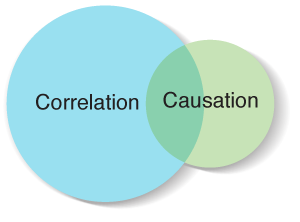Social Media’s Surprising Lack of Impact on SEO
 I find that most marketers—both SEO and social media specialists—seem to be perpetuating that social media activity is a factor in search engine rankings. As I dove in to really understand this issue while writing The Bootstrapper’s Guide to SEO, I learned that what most marketers are spreading is wrong.
I find that most marketers—both SEO and social media specialists—seem to be perpetuating that social media activity is a factor in search engine rankings. As I dove in to really understand this issue while writing The Bootstrapper’s Guide to SEO, I learned that what most marketers are spreading is wrong.
Why Most People Believe Social Activity is a Ranking Factor
For the last few years, most marketers have been shouting from the rooftops about how important social media is, or will soon be, to SEO—myself included. After all, Google’s breakthrough innovation was its ability to gather and arrange third-party intelligence into ranking factors that determined the most authoritative pages and sites on the web. So it might be a natural conclusion, that as the time we’re spending online shifts away from message boards, forums and other early ways of interacting online and moves toward social media, Google must keep up and adjust their ranking factors. The assumption has been that popular social media profiles might edge out websites with high PageRank as the most authoritative influencers of search rankings.
These assumptions were fueled by the fact that tweets appeared in Google searches for a short period (before being removed and have since returned), followed by Google launching its own social network in which it used to display Google+ posts in personalized search results based on your network. A video from Google actually confirmed that they were using Facebook and Twitter links as a ranking factor in 2010.
But here we are, five years later, and Google has yet to fully integrate social signals as a ranking factor.
In a surprise twist, the very real-time-nature of social media that would seem so valuable to search engines actually creates the very challenge that is preventing Google from fully integrating data collected from social media into its search algorithms. Matt Cutts of Google explains why in this video. As Cutts demonstrates with an example of someone blocking a follower or commenter, Google would be making decisions based on once-in-time snapshots of a fluid system of information and connections. Contrast that fluidity with the slightly more stable nature of links and content on fixed web pages and you can see why Google is not willing to give social signals the same weight as traditional links and mentions on high profile websites.
So, as of today, we are left without reason to believe that social media success on its own will improve your search rankings. Yet, there is a strong correlation that leads us to include social media as part of our SEO efforts.
Why Do We Still Include Social Media Marketing in our SEO Efforts?
AJ Kohn has a clear, and clever, article outlining that social signals correlate to better ranking content, but not in the way that many of us expect. His example charts the correlation between the scoops of ice cream consumed and the number of clothing items worn. Based on pure data, one might inaccurately assume that wearing less clothing items might be responsible for the consumption of more ice cream. However, any of us who have been through more than two summers know that the heat is the root cause of both our reduced clothing items and increased appetite for ice cream.
How does this relate to social media and SEO? Easy. The content that Google wants to rank is the same content that people want to share, like and comment on. Great content, in this parallel, is the heat. The more heat you have, the fewer clothing articles worn and the more ice cream consumed. The more great unique content you have, the more search engine rankings AND social media reach you will receive.
The point of this article is to punctuate the root cause of SEO success, and to dispel the misnomer that social media achievements on their own will lead to rank in search engines.
Having the best content, it turns out, will lead to success on both fronts.
How to Use Social Media to Boost SEO Efforts
After the above dissertation, you may be surprised to transition to a section on how social media can boost your SEO efforts. But there are some social media activities that naturally extend our best SEO efforts.
Take the time to set up and nurture your social media channels for your website and company. And, as you embark on your SEO initiative, keep the following suggestions in mind.
1. Invest In Content That Will Get Shared, Be Liked/Tweeted and Build a Following
Generate useful, unique or exciting content on your website that is worth sharing. This is a great catalyst for natural inbound link development.
2. Foster Positive Reviews, Buzz, and Popularity With Those Covering Your Industry
Similar to the last item, this kind of popularity and buzz can not only bring you customers directly, it’s going to have a residual effect on your natural link accumulation.
3. Add Social Share Buttons and Social Connect Buttons to Your Website.
Ensure your website is as social friendly as possible. This includes social share buttons, which are typically included on blog posts or other pages and allow a visitor to share that page easily. These are different than social connect buttons, which help your visitors follow your account or page on social networks.
4. Optimize Your Content For Sharing
The same title and meta description search engines use when previewing your web page in search results is used by social networks to preview your links. Assuming you have those setup and optimized to entice clicks, there is another set of meta tags you will want to include on all pages.
Open Graph meta tags ensure the best possible image is displayed when people share your content on social networks. You may need to discuss this with your web developer, because it does require a little custom coding, but it’s not that complicated. Here is more information about using the open graph to optimize image embeds for each social media network.
5. A Strong Social Media Presence Will Increase Visibility Within Personalized Search Results
For users who are logged in and have a Google+ account with connections, Google search results personalize some search results and show posts by those in their network. Building a wide Google+ network can, theoretically, get increase your search engine traffic. Read this for a more detailed description on the kinds of queries affected.
6. Get Your Newest Content Indexed Faster
At the very least, social media may get your new webpage or blog post indexed quicker. If you have a new website, or your website has not been updated very often recently, the Googlebots and other search engine spiders may not be coming back to your website very often in search of new content. However, social media sites are a hotbed for activity and new content, so it is believed that Google is crawling those sites very frequently. Sharing, tweeting and posting your newest content will likely decrease the time it takes to be indexed when compared to simply adding it to your website.
Conclusion: Social Media and SEO
Going forward, we must keep in mind the assumptions we began the article with. As people spend more time on social media they will create and curate more content there, so I still strongly believe that Google will find a way to integrate social signals more heavily into search ranking factors in the future. And, since social media offers additional benefits outside of SEO, we would be remiss for not tending to our social media presences today.
. . .
This blog post was adapted from The Bootstrapper’s Guide to SEO. For more info on how we use the Search Visibility Report, see our Guaranteed SEO service.







